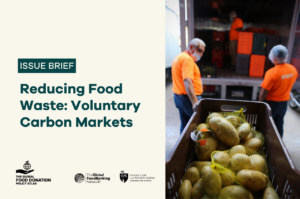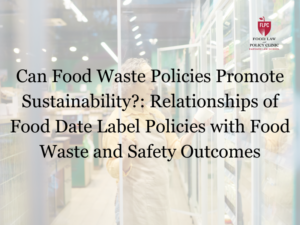Food systems worldwide are facing a dual crisis: one-third of the world’s food goes to waste while upwards of 820 million people face food insecurity. Food redistribution is an effective remediation tool to redirect safe, surplus food to people who need it. According to estimates by the United Nations Environment Programme, if just one-quarter of the food currently lost or wasted was recovered, it could feed 870 million people and prevent the emission of greenhouse gases associated with food loss and waste.
The work of food banks and other organizations that recover and redistribute safe, wholesome food to people experiencing hunger is vital to address the problems of food waste, food insecurity, and climate change. However, uncertainty about how to donate food safely and legally hinders these efforts and creates obstacles for businesses and others seeking to donate food. The solution? Clear and comprehensive policy frameworks. Given the high degree of regulation surrounding food, laws can profoundly influence the potential for food recovery and donation, either facilitating or obstructing these efforts. When it comes to food redistribution, a country’s policy ecosystem can be an enabling force or cause undue friction.
To help address the most pressing legal questions and operational barriers to food donation around the world, the Harvard Law School Food Law and Policy Clinic and The Global FoodBanking Network launched The Global Food Donation Policy Atlas. The project identifies and explains national laws relating to food donation, analyzes the most common legal barriers to food donation, and shares best practices and recommendations for overcoming these barriers. Atlas project research is currently available for 24 countries and counting.
Through three years of comprehensive research, recurring themes and obstacles have emerged across countries and continents. The following recommendations represent the most urgent opportunities to enhance food donation worldwide, thereby reducing hunger and environmental damage.
Issue clear food safety guidance for donated food
In many countries, a significant barrier to the donation of surplus food is the lack of knowledge or readily available guidance regarding safety requirements and procedures for food donation. When food safety laws neglect to address food donation entirely, it is uncertain whether it is even allowed. Even when the legality of food donation is established, potential donors and recovery organizations often grapple with navigating the dearth of food safety regulations specifically related to donated food.
While food banks meet and exceed local and national food safety standards, useful guidance on food safety for donors are essential. Laws, policies, and regulations should make clear that food donation is encouraged while ensuring that donated food meets the highest of standards and poses no risk to recipients. For more information about food safety best practices and examples from around the globe, please refer to our food safety for food donations issue brief.
Provide comprehensive liability protections for food donors and food recovery organizations
Another barrier to the donation of safe, surplus, and wholesome food is the fear among donors that they will be found liable if someone becomes sick after consuming donated food. Due to this fear, many donors choose to throw away food rather than donate it. Many countries do not provide any liability protections, or they have unclear or fragmented policies to address this issue. As a result, many food donors and food recovery organizations are uncertain about whether they are eligible for liability protection, what actions are required to maintain the protection, and what limits, if any, apply to the protection. Providing food donors and food recovery organizations with comprehensive liability protection is a powerful way to encourage food donation. Such protections limit the likelihood that these actors will be held legally or financially responsible for any resulting harm caused by donated food, provided they act in accordance with relevant food safety laws. For more information about liability protection and examples of global best practices, please refer to our liability protection issue brief.
Require standardized date labels
A major driver of food waste and an obstacle to food donation is the general misconception about date labels such as “sell by,” “use by,” or “best by” affixed to food products. Many donors and consumers interpret these date labels as indicators of the safety of food. Despite this interpretation, for the vast majority of foods, date labels indicate freshness or quality rather than food safety, and few foods become more likely to carry foodborne illnesses over time. Donors and food recovery organizations, however, being cautious about food safety, may discard food once the date has passed even if the food is perfectly safe to donate and consume.
In other countries that have measured the impact of date labels, research has found that consumers generally confuse date labels as indicators of safety rather than quality. In the United Kingdom, for example, researchers found that consumers discarded about 22% of food that they could have eaten due to confusion over date labeling. Similarly, 84% of Americans report that they throw away food after the expiration date passes due to safety concerns, even if there is minimal risk of a foodborne illness at that time. This confusion occurs in the home but also impacts food businesses’ willingness to donate as well as stigma against past-date food among food donation recipients.
To remedy this confusion, governments should offer clear guidance about how consumers and food businesses should interpret date labels, implement a dual date labeling scheme that differentiates between safety-based and quality-based labeling, and explicitly permit the donation of safe, edible food after a quality-based date. For a detailed explanation of optimized date labeling policy and international examples, please refer to our date labelling issue brief.
Create tax incentives and remove tax barriers to food donations
Concrete policy measures, particularly smart tax policies, can help incentivize and offset donation costs. National tax schemes can offer deductions and credits for donation and remove barriers that reposition food donation as a cheaper alternative to throwing away food. Too often, however, tax laws and policies fall short of achieving this goal, offering benefits that are too low to effectively incentivize food donation or failing to remove tax obstacles to donation. During consultations with food donors and food rescue organizations in countries participating in the Atlas project, increasing and expanding tax benefits for donors and removing barriers were overwhelmingly cited as top policy priorities. Tax deductions and/or tax credits specifically for in-kind food donations made to qualifying institutions—as well as ensuring the VAT (Value Added Tax) is not levied on donated food—position donation as an economical alternative to discarding food. For more details about tax policies for food donation, please refer to our tax policy issue brief.
Enact food waste deterrence policies
As awareness of FLW grows and food donation efforts expand worldwide, governments are increasingly exploring opportunities to implement policies that will reduce and divert food waste. These food waste deterrence policies are a category of laws and regulatory requirements that restrict the amount of organic waste or food waste that can be disposed of in landfills or incinerators and/or require that food waste generators engage in organic waste diversion. They also can create a financial penalty for wasting food. Unlike policies that may facilitate or incentivize food waste prevention or food donation but can be ignored by disinterested companies, these policies affect businesses more generally and fundamentally change the ability to continue “business as usual” related to food waste. For this reason, food waste deterrence policies are one of the most effective tools policymakers have at their disposal to change the way businesses and consumers manage and value their food waste. To learn more about food waste deterrence policies and various best practices, please refer to our food waste deterrence policies issue brief.
Offer government grants and incentives for food donation
Sustainable and sufficient government grants, incentives, or funding that support food donation activities, such as transportation and infrastructure projects, can better support food recovery efforts. Governments should also offer technical assistance for effective utilization of these funds.
Adopt a national law or policy on food waste that includes food donation
A national strategy on food loss and waste that provides a food donation framework would ensure policy coherence and advance food recovery efforts along the supply chain to promote donation. In particular, governments should specify which ministries or entities are responsible for tackling food waste and food redistribution as, in many cases, confusion surrounding responsibility leads to government inaction.
Food donation is a critical aspect of addressing food insecurity and reducing food waste. National governments can make sure this happens by establishing robust policies that support and encourage the donation of safe food. These recommendations promote the dual goals of protecting recipients from potential risks and minimizing waste of healthy, wholesome food, ultimately fostering a more sustainable and equitable food system for all.


Health Law & Policy, Commentary
Freezing the Freeze: An Update on Litigation Challenging Trump’s Funding Freeze – HCIM
March 27, 2025